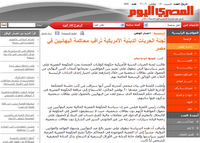The Irony of Change!

While Egypt continues to struggle with its current issues in treating its minorities--a deviation from its past history of tolerance and acceptance--South Africa, a nation long known for its past discriminatory practices and apartheid, is moving in the exact opposite direction with its openly tolerant society and support for minorities. It is ironic indeed that each of these nations hold the continent of Africa as the two jaws of a giant dinosaur, one to the far north and the other to the far south.
The report posted below clearly illustrates the direction South Africa is taking:
"The National Spiritual Assembly of South-Africa hosted a banquet for the Birth of Bahá'u'lláh on the 11th of November in Johannesburg where some 170 guests and about 110 Bahá'ís attended. The occasion not only celebrated the Holy Day but also the 50th year of the anniversary of the election of the first National Spiritual Assembly of the Bahá'ís of South Africa. The Bahá'í Community was indeed privileged to receive a message of congratulations from the State President of this country, Mr. Thabo Mbeki"
MESSAGE BY PRESIDENT THABO MBEKI ON THE OCCASION OF THE 50TH ANNIVERSARY OF THE NATIONAL SPIRITUAL ASSEMBLY OF THE BAHÁ'ÍS OF SOUTH AFRICA
I am most honoured to have this opportunity to extend warm greetings to the National Spiritual Assembly of the Bahá'ís of South Africa on this important day, the 11th of November, in which you celebrate your 50th Anniversary.
That you are today turning fifty testifies clearly to your steadfastness and to the pivotal role you have played and doubtlessly will continue to play in advancing the cause of unity and amity in our beloved country, South Africa.
Since its formation half a century ago, on 11 November 1956, the National Spiritual Assembly of the Bahá'ís of South Africa untiringly has promoted the spiritual, moral and material development of Bahá'ís in this country as well as that of the South African society in general. In this regard, your notable participation in the National Religious Leaders Forum has also contributed immensely in ushering in an age of hope in our country.
The fact that your anniversary falls in the same year in which we commemorate our country's land-marking events, such as the tenth year of our democratic Constitution which recognises and promotes religious freedom, points further to the historical position you occupy in our country.
Accordingly, on behalf of the Government and people of South Africa we say congratulations and best wishes to the National Spiritual Assembly of the Bahá'ís of South Africa on your 50th Anniversary.
May you have more successful and fulfilling decades ahead!
THABO MBEKI
[Arabic translation of the letter can be accessed here....]

























